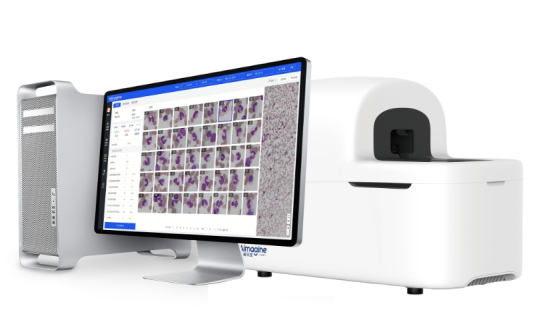A team at the Department of Clinical Laboratory, PUMCH has recently achieved significant progress with Cygnus, a peripheral blood cell morphology analysis system developed under its leadership. When patients have leukopenia, the system's "whole blood film scanning mode" can precisely scan all white blood cells in peripheral blood smears. Compared to traditional methods, the system saves time searching for abnormal cells and improves specimen test accuracy. The system has important value for early screening and clinical diagnosis of hematological diseases.
"When we use traditional microscopy to classify blood smears in patients with leukopenia, the process is time-consuming and labor-intensive, with a high risk of missing important abnormal cells," said Wu Wei, corresponding author of the paper and Chief Laboratory Technician at PUMCH. In patients with leukopenia, white blood cell density in peripheral blood smears is very low, requiring manual microscopic examination across multiple visual fields, hence the high risk of missed detection.
The Cygnus Automated Blood Cell Morphology Analysis System developed by the team can achieve whole blood film scanning. Using the whole-slide imaging technology featuring real-time dynamic focusing functionality, the system captures white blood cell information from entire blood smears, eliminating sampling bias inherent in existing "sampling analysis" methods and significantly improving abnormal cell detection rates. Researchers included 157 specimens from patients with leukopenia (WBC ≤ 2.0×10⁹/L). Manual microscopic examination confirmed the presence of blast cells in 17 specimens, and Cygnus's “whole blood film scanning mode” detected all 17 positive cases with 100% accuracy. For detected blast cells, Cygnus can also roughly localize their positions on the peripheral blood smear, aiding microscopic verification by lab technicians.
Cygnus's software algorithms automatically extract high-dimensional features inherent to blood cell morphology, thereby able to recognize more complex fine-grained morphological differences, avoid subjective bias and make results more objective. Compared to traditional methods, Cygnus not only saves time searching for abnormal cells but also improves specimen test accuracy.
Chief Laboratory Technician Wu Wei explained that Cygnus obtained in 2022 the registration certification as "Assisting WBC Recognition Software for Peripheral Blood Cell Images" (National Medical Device Registration No.: 20223211473), making it China's first device to receive AI-powered Class III medical device registration certification in the in vitro diagnostics field. Its performance is on par with international standards and enables early disease screening and precision medicine, a milestone for AI in clinical laboratory testing. Cygnus applications for red blood cells, platelets, parasites, and body fluids are also under development. In 2024, the "Automatic Plasmodium Parasite Scanning and Analysis System" (DE/CA24/00120819) obtained CE certification.
PUMCH’s Department of Clinical Laboratory seeks interdisciplinary collaboration to break down professional silos and promotes digital innovation to advance laboratory medicine. The department has been building intelligent laboratory systems, and this morphological analysis breakthrough exemplifies their progress. Moving forward, the department plans to further develop automated, intelligent, and precision technologies, driving meaningful progress in morphological analysis with technological innovation.

▲The Cygnus Automated Blood Cell Morphology Analysis System
Written by Zheng Lin, Wang Tong and Ma Chaochao
Pictures courtesy of the Department of Clinical Laboratory
Reviewed by Yang Qiwen and Wu Wei
Edited by Dong Jingge
Chief editor Duan Wenli
Supervised by Wu Peixin
